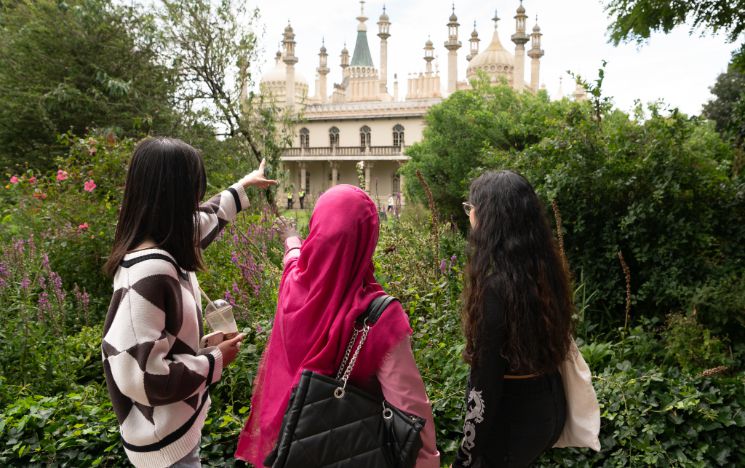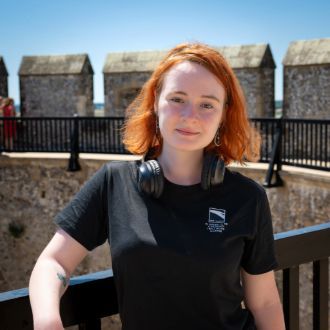Summer School: Media, Arts and Humanities
Learn about British history and culture and express yourself creatively in our Faculty of Media, Arts and Humanities.

Immerse yourself in culture and creativity
Our modules tell the story of how British culture and history has shaped the nation, focusing on local sites such as the opulent Royal Pavilion in Brighton, once the seaside pleasure palace of King George IV.
You can also explore the booming industry of video games, imagining your own story-worlds and investigating the social and ethical dimensions of gaming.
Apply for Undergraduate Summer School 2026
Applications for Summer School 2026 are now open!
Session 1: Monday 29 June 2026-Friday 17 July 2026
Session 2: Monday 20 July-Friday 7 August 2026
Session 1 and 2: Monday 29 June-Friday 7 August 2026
Email summer@sussex.ac.uk with any questions.

Undergraduate Summer School 2025 student, studied the ‘British History from Regency to Radicalism’ module.
Modules you can study
Select from the following modules:
Session One
- British History from Regency to Radicalism
Undergraduate Summer School - British History
- Video transcript
[Man speaks to camera]
Hi, I'm Dr Iain McDaniel. I'm an Associate Professor, and I teach History here in the History department at Sussex.
Since its founding in 1961, the University has really been known for challenging convention. As you can see on this amazing mural from the 1960s behind me. And challenging convention is exactly what would be encouraging you to do on the British History Summer School module, here at Sussex.
You'll be uncovering a different kind of British History from revolutionaries in the 18th century, such as Thomas Paine, all the way through to youth movements like the mods and the rockers, punks and ravers.
You'll uncover how the past still continues to shape contemporary Britain, playing out through themes of monarchy, empire, social justice and youth movements. And you'll get to use some of the most amazing archives that we've got here on campus or just off campus, including the really fantastic Mass Observation Archive of British social and cultural History.
So come and join us on this module in British History here at the University of Sussex. Where I would say that you get to uncover not only a different but really surprising history of Britain, one that isn't just about kings and queens, but also about radicals, revolutionaries and figures who really imagined a different kind of Britain.
I'm looking forward to meeting you next summer for the British History Summer School module.
[End card: fade out of blue, green and purple colours with the University of Sussex logo]
Module code: IS442
This module provides an overview of what has changed (and what has not) in British society and culture since the late eighteenth century. It features radicals and revolutionaries, as well as royalists. It explores how change was driven by ordinary men and women, alongside the powers of empire, aristocracy and monarchy.
The module begins with the life and times of Thomas Paine, the famous British revolutionary whose Common Sense helped spark American independence. You’ll visit Paine’s home in Sussex where his revolutionary ideas were first hatched. You’ll encounter the vibrant life of Regency Brighton, encapsulated in the dazzling Royal Pavilion. You’ll discover how ordinary Britons responded to the Second World War, and you’ll explore the power of British youth culture, from mods and rockers to punks and ravers.
Throughout all this you’ll be immersed in a wide range of sources and archives, including The Mass Observation Archive and our library's extensive collection of decolonisation materials. You will learn advanced skills of historical analysis and gain not only historical skills but fresh insight into how the past continues to shape contemporary Britain. Why have the legacies of empire become a source of such controversy? How has the monarchy been able to survive through eras of crisis? What is the future of the Anglo-American “special relationship”, 250 years after Paine’s call for American independence? These questions require us to confront the longer-term historical patterns in a nation which struggles to confront both its past and its present.
This module is suitable for students who have an interest in how history has shaped contemporary British culture and society. A background in history is not required.
Learning outcomes:
- use historical knowledge and evidence to analyse and contextualise contemporary issues and challenges
- demonstrate skills of source analysis, archival investigation, textual interpretation and evaluation
- investigate the influence of events and ideas across historical periods
- understand key debates and conflicts in British history since the late eighteenth century.
Teaching method: Lecture, Seminar, Fieldwork
Assessment: Portfolio (90%), Observation (10%)
Contact hours: 40 hours
Credits: 15 Sussex Credits
Level: 4Interested in studying with us for six weeks? British History pairs well with A Post-Liberal World to give you a wide understanding of the crossover between contemporary history and politics.
- Video transcript
- Video Games: Creative and Critical Writing
Module code: IS403
In recent years the gaming industry has been transformed by the addition of auteur-driven indie games to those of AAA studios with Hollywood budgets, as well as by the diversity of technology on which games can be played. We will study examples of successful imagined worlds (Zelda: Breath of the Wild), powerful storytelling (The Last of Us), literary games (Kentucky Route Zero), indie games (Braid), micro-Indies (Problem Attic) and classic adventure games (Monkey Island), among others.
We will explore the possibilities of play, world-building, narrative, character-design, game mechanics, and game dynamics. Technical understanding of the medium will provide us with an array of opportunities for writing and imagining video games; composing narratives and shooting-scripts, creating avatars and developing fictional worlds. We will introduce you to some game development software, though this module is not designed as a coding course. It is ideal for students looking beyond the surface of video games, wanting to engage with thoughtful critique of an emerging industry. We will reflect on the social implications of game design, taking into account discourses around gender, race and sexuality.
Learning outcomes:
- understand and experiment with common practices of creative writing across multiple video game genres
- reflect critically on the social implications of game design, taking into account discourses around gender, race, and sexuality
- communicate the results of critical reflection in a collegial group discussion
- evaluate the appropriateness of different approaches to solving problems when relating the creative aspect of game design to critical reflection on the social aspects of games.
Teaching method: Workshops
Assessment: 90% portfolio, 10% observation
Contact hours: 40 hours
Credits: 15 Sussex Credits
Level: 4If you are interested in this module, please see our Session Two module British Cinema.
Session Two
- British Cinema
Module code: IS426
This module provides a historical survey of British cinema as well as an introduction to critical and theoretical debates associated with national cinema. You’ll examine the relationship between British cinema and British culture, history and national identity. You’ll also consider how British cinema has represented other dimensions of identity such as class, gender, ethnicity and sexuality. You’ll analyse a range of films in order to explore how British cinema:
- responded to the Second World War and the decline of the British Empire
- has been discussed in relation to notions of “realism” and “heritage”
- has engaged with transformations of society associated with multiculturalism
- functions in a transnational or even post-national era.
You’ll also consider how specific genres such as the crime film and the period drama have functioned in the national and international marketplace.
This module is suitable for students who have an interest in humanities, film and cultural Studies. A background in these subjects is not required.
Learning outcomes
- develop an awareness of the problems involved in constituting a 'history' of a British national cinema
- develop a critical understanding of British cinema's production of representations of Britishness and Englishness, its constitution of 'otherness', and its representations of gender, race, class and community
- develop an understanding of the changing political and cultural context in which such representations have been produced
- develop an ability to critically analyse specific film texts in light of these understandings.
Teaching method: seminar, film
Assessment: learning diary (70%), presentation (20%), observation (10%)
Contact hours: 40 hours
Credits: 15 Sussex Credits
Level: 5If you are interested in this module, you may also want to explore two of our Session One modules: British History and Video Games.
Read our top tips for choosing your modules. You can also find out about our teaching structure, assessment process and how your credits transfer back to your home institution.